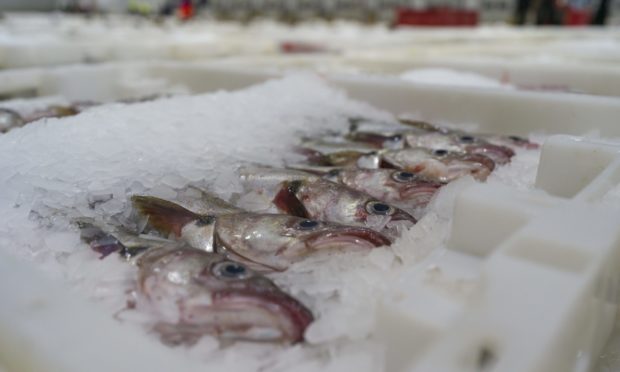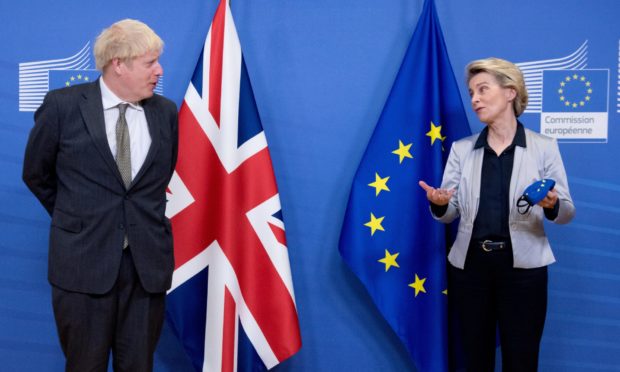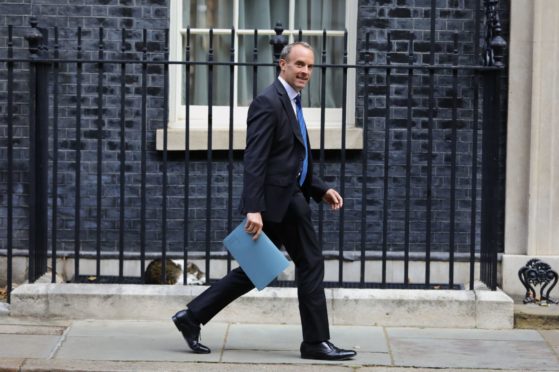British airlines and hauliers could be banned from travelling to the continent unless Boris Johnson agrees to give EU fishermen “continued access” to UK waters in the event of a no-deal Brexit, Brussels has warned.
In a move designed to ratchet up pressure on the prime minister, the EU unveiled a four-point no-deal “contingency plan” to ensure air and road transport between the UK and EU can continue if negotiators fail to find a breakthrough in trade talks.
As a condition for access to the single market, Brussels has proposed a temporary, year-long fisheries agreement that would see EU fishermen have “continued access” to UK waters.
The EU document states: “These provisions would provide legal certainty for the fishing industry and ensure the conservation of the fish stocks.”
Number 10, along with the fishing industry, have rejected the idea – branding it “laughable”.
Scottish Fishermen’s Federation boss Elspeth Macdonald said: “If there is no fisheries agreement in place by the end of this year, the EU fleet will have no right of access to UK waters and vice versa.

“What the EU is seeking is an extension by a year of the current arrangements under the common fisheries policy, which is laughable and would be totally unacceptable to the Scottish fishing industry.
“Were the UK to accede to this in its first act as an independent coastal state, it would be a travesty.
She added: “It is also disingenuous of the EU to contend that there would be no certainty on fishing. While there would be no fisheries agreement, the two sides could sit down as equal independent coastal states and within a matter of days resolve the issues of access, quota shares and conditions for the year ahead.
“Ultimately, it is up to the EU which of the two routes it wishes to take towards the UK becoming a coastal state – through a stable framework agreement that respects UK sovereignty and follows similar arrangements that the EU has with other coastal states in the north-east Atlantic, or via a less structured route for the EU where everything is done through annual negotiations with no framework agreement in place.”
‘Take back control of our waters’
A Downing Street spokesman added: “At the end of the transition period we will take back control of our waters.
“We would never accept arrangements and access to UK fishing waters which are incompatible with our status as an independent coastal state.”
The proposals come after Boris Johnson and European Commission president Ursula von der Leyen held crunch talks over dinner in Belgium on Wednesday aimed at breaking the deadlock.
Following the meeting, Downing Street warned “very large gaps” remain.
The pair agreed that a decision on the future of the negotiations will be taken by the end of the weekend.
Bold. In the event of a no-deal the EU's 'contingency' plan states there should be continued reciprocal access on fishing. Given that's one of the main bones of contention in trade talks, doubt the UK would or even could accept that in a no-deal https://t.co/EnAuaapdWS pic.twitter.com/QqDLBprDbd
— Dan O'Donoghue (@MrDanDonoghue) December 10, 2020
President von der Leyen, speaking after unveiling the no-deal plan, said: “Negotiations are still ongoing. However, given that the end of the transition is very near, there is no guarantee that if and when an agreement is found, it can enter into force on time.
“Our responsibility is to be prepared for all eventualities, including not having a deal in place with the UK on January 1 2021. That is why we are coming forward with these measures today”.
Raab calls for ‘progress and flexibility’ from EU
Dominic Raab told the BBC on Thursday that, while he could not rule out a further extension in the talks process, it is important to have “finality”.
He said: “I think it’s unlikely but I can’t categorically exclude it.”
The Cabinet minister added that there has not been “enough pragmatism and flexibility on the EU side” and called for “substantial movement” from the bloc in order to seal a deal before the weekend is out.
“I don’t think we can keep going on at that pace without having some progress and some flexibility,” he told the BBC.
“Particularly from the UK side, we look at the differences on fairly key points of principle – fairly narrow in scope, we are talking about fisheries, level playing field commitments, the EU’s attempt to lock us in to their rules – we need to see substantial movement.”
UK chief negotiator Lord Frost and his EU counterpart, Michel Barnier, reconvened in Brussels on Thursday to begin their final push to salvage what has been almost a year of wrangling over a trade deal.

